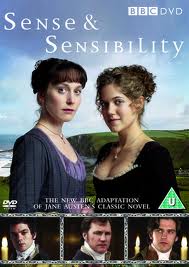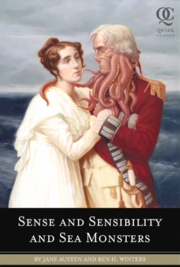For therapy, I listen to recorded books while walking. (And I didn't check my spelling with hard copies of the texts discussed in this post, so don't be surprised if there are discrepancies.) Since I'm committed to exercizing every day I possibly can, and I don't always have a recorded book on hand, sometimes I end up listening to something that isn't necessarily on my "need to read" list.
This is how I found myself listening to Sense and Sensibility, by Jane Austen. I grabbed it off the shelf at the library only knowing that it was famous, the author had a pretty good reputation, and I didn't remember what I had read years ago of hers as unpleasant. Besides, it looked better than the other things I saw on the library audio book shelf.
But frankly, I was a bit disappointed. It was just so fluffy and pointless. I'm just not that interested in English societal customs of the early 1800s, and these women went on and on about their prospects of marriage, social calendar, and who would inherit how much. As soon as I got another book, I listened to that one, but then found myself needing a book again. Since I had the audio book on my phone already, I picked Sense and Sensibility back up. I was more into the story, and managed to finish it without it feeling like too much of a punishment, but it's not like pondering on its story adds value to my character. (Unlike Jane Eyre, which, though it could be compared to Sense and Sensibility for several reasons, is, in my opinion, of much greater moral and literary worth.)
I do have to give Jane Austen credit, though, as in preparing for this post I learned that Sense and Sensibility was her first book and she wrote it when she was only 19. Much of it is drawn from her own observations about herself and those around her, and as such, is a remarkable work.  I also watched the award winning BBC TV movie version, which I enjoyed more than the book.
I also watched the award winning BBC TV movie version, which I enjoyed more than the book.
Since I'd just read Sense and Sensibility though, it seemed a good opportunity to check out the spoof, Sense and Sensibility and Sea Monsters by Ben H. Winters. 
Sea Monsters takes the plot of the original and follows it rather closely, with radical changes, of course. I imagine Ben Winters having the entire text of Jane Austen's on his computer and going from the beginning to the end making changes and adding sea salt. The characters have the same names, so the plot is somewhat predictable, again, with radical changes. Many of the conversations are followed almost word for word, giving them a comical twist as the lingo and characteristic plot of Austen's 19th Century England is combined with the rather gory and twisted nature of this new, alternative universe where as a result of the "alteration," creatures of the sea have mysteriously risen up in rebellion against land dwellers.
If you're interested, let me tell you some of the entertaining comparisons between the two books. If you haven't read the original, you can probably guess which parts are new. The handsome Willoughby often wears a diving suit complete with diving helmet with a portcullis window he opens to speak through and is admiredly referred to as "dashing in his flippered feet." Colonel Brandon not only has the fault of being too old for the heroine, but has tentacles growing from his face that are described as extremely disgusting, but can be overlooked (well, if one does not look at him) because of his good character.
Eleonore is again a talented artist, but in the carving of driftwood rather than painting. Individuals are admired for their ability to swim well and their lung capacity. Stories of shipwrecked and attacked sailors are valued. Individuals seem to have giant octopi, tuna, or fantastical sea creatures continually threatening the main characters and tearing apart the expendable ones. And the story gets even further into the world of make believe as they spend "the season" not in London, but in Submarine Station Beta, a large city built under a dome on the bottom of the sea where people ride dolphins, food is difficult to acquire (since fires are not allowed it is mainly flavored gelatin), and its gill-less inhabitants are required to wear small oxygen tanks for safety because of what happened at Submarine Station Alpha.
Mr. Winters does add a new sub plot that builds suspense and gives the reader something to look forward to that wasn't already told in the original book. Pirates, sea witches, mysterious happenings keep the reader wondering what could be next.
And just for kicks, here is the video they did to promote the book. This scene does not actually occur in the book, but it does give a feel for the sarcasm and gore in store for the reader.
Sense and Sensibility and Sea Monsters had me rolling my eyes like I hadn't since being a teenager. But to top it all off with a final revolution or two, as well as a good laugh, it actually ends with a reader's discussion guide. This guide is introduced with the statement "Sense and Sensibility and Sea Monsters is a multi-layered study of love, sisterhood and giant octopi. We hope these questions will deepen your appreciation and enjoyment of this tiring work of classic sea monster literature."
Here are the last three questions:
8. Have you ever been romantically involved with someone who turned out to be a sea witch?
9. Life in Submarine Station Beta is marked by a dissipation and devotion to amusement impossible to achieve outside the dome where constant sea monster attacks are a fact of life. Do you think the apocalyptic destruction of the station by an army of fish is meant as a comment on that kind of indulgent lifestyle?
10. Is Monsieur Pierre a symbol for something? Name three other works of Western literature that feature orangutan valets. Are those characters also slain by pirates?
Okay, I think I need to do better with my "need to read" list. What do you suggest, and why?






I recommend Chris Stewart’s The Great And Terrible series. It’s true fiction…or fictional truth…and, like very exciting.
I suggest “The Omnivore’s Dilemma”. Excellent book about food and where it comes from. It was quite eye-opening! It’s available on audiobook.